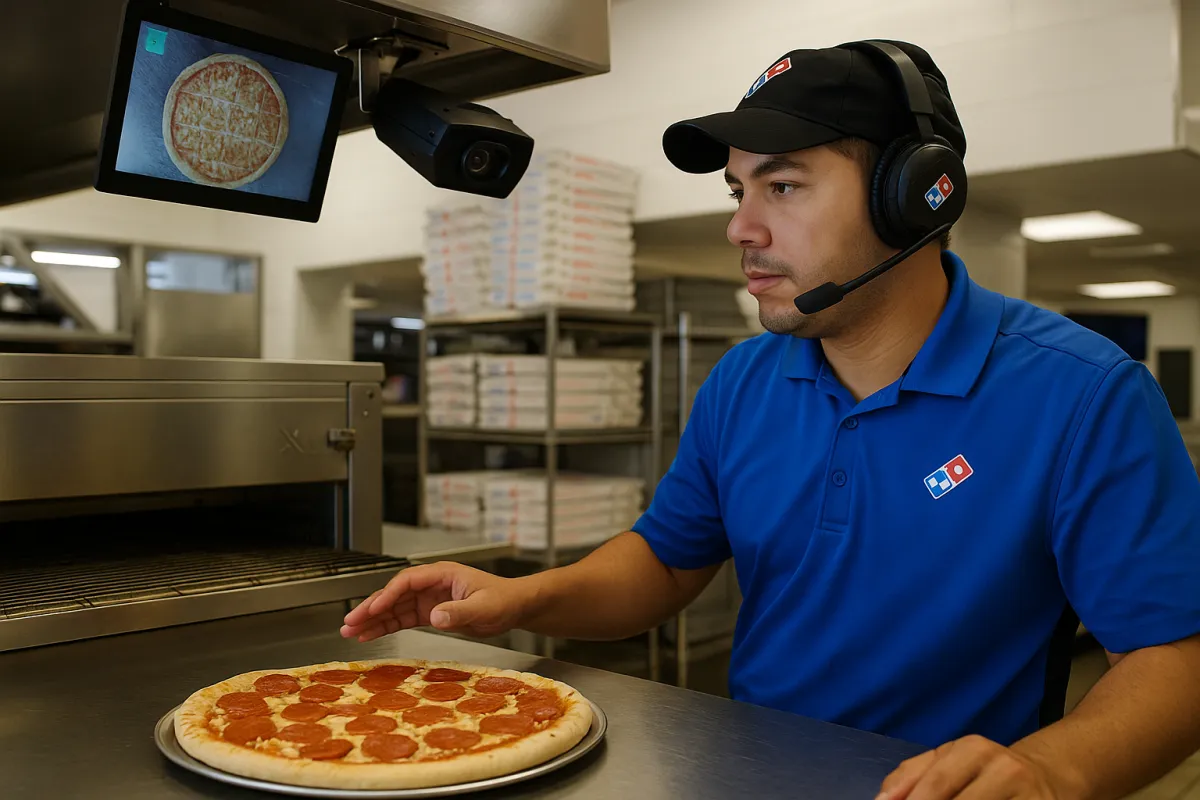
Why Domino's AI Integration Makes Every Other Fast Food Chain Look Like They're Operating in the Stone Age
Why Domino's AI Integration Makes Every Other Fast Food Chain Look Like They're Operating in the Stone Age
Domino's has distinguished itself in the fast food industry by strategically integrating AI across multiple facets of its business, yielding tangible improvements in efficiency, customer experience, and operational decision-making that most retailers haven't attempted.
Their AI algorithms can anticipate customer orders before they're placed by analyzing online ordering behavior, enabling pizza preparation as soon as the system detects high order completion likelihood. This predictive capability delivers faster preparation and delivery times while giving drivers more delivery opportunities.
This isn't just restaurant technology innovation. This is a blueprint for AI-driven customer experience transformation that demonstrates how market leaders use artificial intelligence to fundamentally change competitive dynamics rather than just improving operational efficiency.
The Predictive Ordering Revolution
Domino's uses AI algorithms to anticipate customer orders even before they are placed, analyzing online ordering behavior to start pizza preparation as soon as high order completion probability is detected.
The predictive ordering capability demonstrates how AI creates competitive advantages through anticipation rather than reaction, enabling superior customer experience through reduced wait times and improved service delivery.
Restaurants that wait for completed orders will find themselves unable to compete with AI-enhanced operations that begin preparation based on predictive intelligence rather than confirmed transactions.
The Voice AI Personalization Strategy
Domino's has invested in advanced voice AI assistants for phone and drive-thru orders using natural-sounding, region-specific voices that make interactions more comfortable and human-like, reducing order abandonment due to robotic experiences.
The personalization strategy reveals how AI creates customer engagement advantages through human-like interaction quality that traditional automated systems cannot achieve.
Food service companies that maintain basic automated ordering will find themselves losing customers to AI-enhanced voice systems that provide superior interaction experiences and higher order completion rates.
The Quality Control Automation Achievement
Domino's employs AI cameras and smart scanners to ensure every pizza matches quality standards by comparing each pizza against datasets defining perfect pizza appearance, maintaining consistent product quality at scale.
The quality automation demonstrates how AI creates operational consistency that human quality control cannot match for accuracy, speed, and scalability across large restaurant networks.
Restaurant chains that rely on human quality control will find themselves unable to achieve the consistency and efficiency that AI-powered quality systems provide across multiple locations and high-volume operations.
The 95% Prediction Accuracy Breakthrough
Domino's improved AI prediction accuracy from 75% to 95% through powerful computing resources including Nvidia GPUs that enable rapid AI model training and retraining for continuous improvement.
The accuracy breakthrough reveals how AI performance requires infrastructure investment rather than just software implementation, creating competitive advantages through superior prediction capabilities.
Companies that implement AI without adequate computing infrastructure will achieve limited accuracy and value compared to organizations that invest in comprehensive AI capability development.
The Demand Forecasting Intelligence
Domino's leverages machine learning on historical sales, weather, and local event data to predict demand for specific menu items, enabling efficient ingredient stocking that minimizes waste while ensuring faster service.
The forecasting intelligence demonstrates how AI creates inventory optimization that traditional forecasting methods cannot achieve through comprehensive data analysis and predictive modeling.
Restaurant operations that maintain traditional inventory management will find themselves at cost and service disadvantages compared to AI-enhanced forecasting that optimizes both efficiency and customer satisfaction.
The Delivery Route Optimization Impact
AI algorithms analyze real-time traffic and historical delivery data to optimize delivery routes, reducing delivery times and fuel costs while supporting more reliable customer experience.
The optimization impact reveals how AI creates operational efficiency that extends beyond restaurant operations to delivery logistics that affect customer satisfaction and cost management.
Food delivery services that rely on traditional routing will find themselves unable to compete with AI-optimized delivery systems that achieve superior speed, cost efficiency, and customer experience.
The Personalized Marketing Enhancement
Domino's uses AI to analyze customer data for targeted marketing campaigns and sentiment analysis on feedback and reviews, enabling personalized promotions and rapid response to customer concerns.
The marketing enhancement demonstrates how AI creates customer relationship advantages through data analysis capabilities that traditional marketing approaches cannot achieve for personalization and responsiveness.
Restaurant companies that maintain traditional marketing will find themselves unable to compete with AI-enhanced customer engagement that delivers superior personalization and relationship management.
The Hardware Investment Strategy
Domino's recognized that powerful computing resources are essential for training and retraining AI models quickly, enabling continuous improvement and real-time operational decision-making.
The hardware strategy reveals how successful AI implementation requires infrastructure commitment rather than just software adoption, creating sustainable competitive advantages through superior AI capabilities.
Companies that implement AI without infrastructure investment will achieve limited performance compared to organizations that ensure adequate computing resources for comprehensive AI development and deployment.
The Autonomous Technology Experimentation
Domino's is testing autonomous delivery vehicles and robotics for delivery and food preparation, aiming to further streamline operations and reduce reliance on human labor for routine tasks.
The experimentation approach demonstrates how AI leaders explore emerging technologies rather than limiting implementation to current capabilities, creating future competitive advantages through innovation leadership.
Restaurant companies that focus only on current AI applications miss opportunities for next-generation competitive advantages that experimental AI technologies provide through operational transformation.
The Back-of-House AI Integration
Domino's is developing AI assistants to help store managers with inventory, ingredient ordering, and staff scheduling tasks, reducing manual workload and human error in operational management.
The integration approach reveals how comprehensive AI transformation affects all restaurant operations rather than limiting implementation to customer-facing applications that don't optimize entire business operations.
Restaurant chains that implement AI only for customer service miss opportunities for operational optimization that comprehensive AI integration provides through back-of-house efficiency and accuracy improvements.
The Data-Driven Decision Framework
Domino's success with AI stems from commitment to collecting and leveraging vast amounts of operational and customer data for decision-making across all business functions.
The framework demonstrates how AI transformation requires data strategy that supports artificial intelligence capabilities rather than treating data as byproduct of business operations.
Companies that implement AI without comprehensive data strategies will achieve limited value compared to organizations that systematically collect and analyze data for AI-driven decision-making.
The Customer Journey Optimization
Domino's uses AI not just for efficiency but to enhance every aspect of the customer journey from ordering to delivery to post-purchase engagement and relationship management.
The optimization approach reveals how successful AI implementation affects entire customer experience rather than isolated touchpoints that don't create comprehensive competitive advantages.
Restaurant companies that apply AI to individual processes miss opportunities for customer experience transformation that end-to-end AI implementation provides through journey optimization.
The Continuous Improvement Culture
Domino's invests in both AI software and necessary hardware to ensure models remain accurate and relevant through continuous improvement rather than static implementation approaches.
The improvement culture demonstrates how AI transformation requires ongoing development rather than one-time deployment, creating sustainable competitive advantages through evolving capabilities.
Companies that treat AI as fixed technology implementation will find themselves unable to compete with organizations that continuously improve AI capabilities through systematic development and optimization.
The Industry Leadership Position
Domino's AI adoption positions them as leader in food service industry AI implementation, demonstrating thoughtful end-to-end integration that drives both operational excellence and customer loyalty.
The leadership position reveals how comprehensive AI transformation creates market influence that extends beyond direct competitive benefits to industry standard-setting and strategic partnership opportunities.
Restaurant companies that delay AI transformation will find themselves following rather than leading industry evolution while AI pioneers establish dominant competitive positions.
The Competitive Differentiation Strategy
Domino's AI integration creates multiple competitive advantages including faster service, better quality, lower costs, and superior customer experience that traditional restaurant operations cannot match.
The differentiation strategy demonstrates how comprehensive AI implementation creates sustainable market advantages that compound over time rather than providing temporary efficiency improvements.
Restaurant chains that maintain traditional operations will find competitive gaps too large to close through conventional improvements once AI leaders establish dominant market positions through technology-enhanced capabilities.
The Customer Experience Revolution
AI enables Domino's to provide predictive service, personalized interactions, consistent quality, optimized delivery, and responsive customer relationship management that traditional restaurant service cannot achieve.
The revolution reveals how AI transforms customer expectations by providing service capabilities that become new baseline requirements for competitive restaurant operations.
Food service companies that maintain traditional customer experience approaches will find themselves unable to meet expectations that AI-enhanced competitors establish as industry standards.
The Operational Excellence Integration
Domino's demonstrates how AI creates operational excellence through prediction, optimization, automation, and intelligence that affects every aspect of restaurant operations and customer service.
The excellence integration shows how comprehensive AI transformation creates systematic competitive advantages rather than isolated improvements that don't affect overall business performance.
Restaurant operations that implement limited AI applications miss opportunities for operational transformation that comprehensive integration provides through systematic optimization and enhancement.
The Strategic Investment Philosophy
Domino's AI investment represents strategic commitment to technology transformation that creates long-term competitive advantages rather than limiting focus to cost reduction or efficiency improvements.
The investment philosophy demonstrates how market leaders approach AI as fundamental business strategy rather than optional technology enhancement that may not affect competitive positioning.
Companies that limit AI investment to efficiency projects miss opportunities for competitive advantage creation that comprehensive AI transformation provides through enhanced capabilities and market positioning.
The Future Restaurant Reality
Domino's AI transformation establishes restaurant industry reality where AI capabilities become essential for competitive operations rather than optional enhancements that companies can delay.
The future reality reveals why restaurant AI transformation requires immediate strategic commitment rather than gradual evaluation that delays competitive advantage while AI leaders establish market dominance.
The choice facing every restaurant executive is whether to embrace comprehensive AI transformation that creates sustainable competitive advantages or continue traditional approaches while AI-enhanced competitors establish insurmountable operational and customer experience advantages.
The Executive Decision Framework
Domino's AI implementation provides decision framework that restaurant executives can adapt for their own competitive circumstances and customer experience requirements.
The framework prioritizes comprehensive AI integration over isolated applications, customer experience enhancement over operational efficiency alone, and strategic transformation over incremental improvement.
Organizations that apply similar comprehensive AI approaches will achieve competitive advantages while companies focused on limited AI implementation will struggle to compete with AI-enhanced market leaders.
The evidence is compelling: Domino's transformed restaurant operations through predictive AI, personalized interactions, automated quality control, and optimized delivery that traditional competitors cannot match. The strategic choice facing every restaurant executive is whether to commit to similar AI transformation or accept competitive disadvantage to organizations that make AI central to their customer experience and operational strategy.

